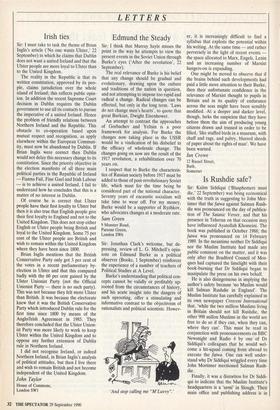Edmund the Steady
Sir: I think that Murray Sayle misses the point in the way he attempts to view the present events in the Soviet Union through Burke's eyes ('After the revolution', 22 September).
The real relevance of Burke is his belief that any change should be gradual and evolutionary, drawing upon the culture and traditions of the nation in question, and not attempting to impose too rapid and radical a change. Radical changes can be effected, but only in the long term. 'Laws do not change men's hearts', to quote that great Burkian, Dwight Eisenhower.
An attempt to contrast the approaches of Gorbachev and Yeltsin is a poor framework for analysis. For Burke the changes now taking place in the USSR would be a vindication of his disbelief in the efficacy of wholesale change. The changes going on now are the result of the 1917 revolution, a rehabilitation over 70 years on.
I suspect that to Burke the characteris- tics of Russian society before 1917 must be added to those of post-revolutionary Soviet life, which must for the time being be considered part of the national character. Seventy years of encaustic socialism will take time to wear off. For my money, Burke would be a supporter of Ryzhkov, who advocates changes at a moderate rate.
Sam Green
9 Munster Road, Parsons Green, London SW6


























































 Previous page
Previous page